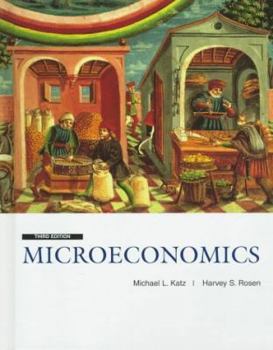Microeconomics
Select Format
Select Condition 
Book Overview
This is a Microeconomic theory text for courses in economics departments and business schools. This description may be from another edition of this product.
Format:Hardcover
Language:English
ISBN:0256171769
ISBN13:9780256171761
Release Date:August 1997
Publisher:Irwin/McGraw-Hill
Length:656 Pages
Weight:3.02 lbs.
Dimensions:1.3" x 8.4" x 10.3"
Customer Reviews
5 ratings
Straightforward intermediate microeconomics
Published by Thriftbooks.com User , 20 years ago
this is by no means an introductory economics text.. It's an intermediate level textbook.. It assumes that the student is capable of certain mathematical techniques (you can't expect a beginner to calculate the optimal consumer choice using the Lagranges method in chapter 3! - and it gets worse)It is true that most of the time you have to flip the page to find the graph that is being explained. However it didn't annoy me too much. It is actually good thing if you want to practice and draw the graph yourself.The 2nd edition had some errors but in this edition (3rd) they are corrected as far as I could see.About the authors: Michael Katz - University of California at Berkeley. Received the Earl F. Cheit Outstanding Teaching Award in 1989 and 1993. Served as chief economist of the U.S. Federal Communications Commission.Harvey Rosen - Princeton University, Fellow of the Econometric Society and a Research Associate of the National Bureau of Economic Research
misunderstanding
Published by Thriftbooks.com User , 20 years ago
1. I did not read the book so I can not talk about the book, althoug I should have rate it otherwise I could not have submit this review! I rate it based on the info given by my professor of macroeconomics!2. I want to make comments on the review of Mr. adoumri; I would say that he was disappointed with the book because, as can be seen from his review, hi actually wanted to learn things from macroeconomics, but unfortunatelly he took a book for microeconomics, so he is actually talking about apples having in mind pears!! :-)One should be cautious when writing, as well as when reading other people's reviews!Thank you!
Does the job it was written for
Published by Thriftbooks.com User , 23 years ago
This is a very well written textbook. There are many textbooks out there on the markets and this one has been written with the beginning reader in mind. It is just too easy to scare the beginner with too-serious, too-academic dry language. Economics is fun to learn and the first textbook a student ever keeps in hand should make him interested, curious, wanting more and more, and of course, amused. The language of Katz and Rosen's textbook is by no means frivolous, but it is entertaining. They do not pull the rabbit out of the hat and startle the reader. Instead, they guide readers from familiar environment towards the unknown, always being down to earth and somehow, interestingly, economic theory sneaks in - in the meantime.The order of theory presentation and the structure of the book really facilitate learning. I have used this book with the introductory microeconomics course, along with a few other ones - just for a test. They all preferred this one so we stuck with it for the remainder of the course.In the middle of the book one finds a transparency with a graph, which, when applied, shows the effects of some parameter change. Excellent idea, as the student can see dynamically what happens with the application. It's like a hand-operated video... It's a pity that there is only one such transparency. In summary, recommended for most introductory courses in microeconomics. it will keep students interested and will not scare them at all. Why want anything more?
Clarity has its price: Verbosity
Published by Thriftbooks.com User , 24 years ago
Is it: a)wordy, b)understandable, c)good in explaining concepts? All three, interestingly. I've seen better (Mankiw) AND worse (the name slips my mind, but it was from a professor in Iowa) microeconomics texts. The main problem is that in striving to explain the concept (which the author does very well), he really beats it in. But if you miss lectures (or have a new prof who teaches from the book, as was my case), then you should do no wrong with this book.
A good tool for good teachers.
Published by Thriftbooks.com User , 25 years ago
Economics is simple. This book teaches economics by emphasizing its simplicity. By including/excluding certain sections, it can indeed be used for high school students up to some (non-economics) graduate school classes. I have taught microeconomics to undergraduates for years and this is the most effective book at teaching students from a wide variety of backgrounds (meaning majors and non-majors). Students with a strong quantitative background or those wanting to learn about economics more in depth should probably buy something else.






